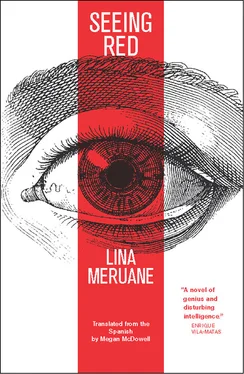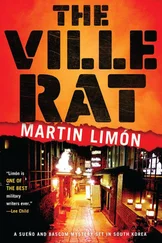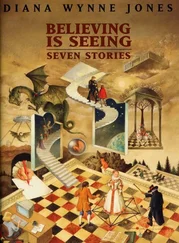Lina Meruane - Seeing Red
Здесь есть возможность читать онлайн «Lina Meruane - Seeing Red» весь текст электронной книги совершенно бесплатно (целиком полную версию без сокращений). В некоторых случаях можно слушать аудио, скачать через торрент в формате fb2 и присутствует краткое содержание. Год выпуска: 2016, Издательство: Deep Vellum Publishing, Жанр: Современная проза, на английском языке. Описание произведения, (предисловие) а так же отзывы посетителей доступны на портале библиотеки ЛибКат.
- Название:Seeing Red
- Автор:
- Издательство:Deep Vellum Publishing
- Жанр:
- Год:2016
- ISBN:нет данных
- Рейтинг книги:3 / 5. Голосов: 1
-
Избранное:Добавить в избранное
- Отзывы:
-
Ваша оценка:
- 60
- 1
- 2
- 3
- 4
- 5
Seeing Red: краткое содержание, описание и аннотация
Предлагаем к чтению аннотацию, описание, краткое содержание или предисловие (зависит от того, что написал сам автор книги «Seeing Red»). Если вы не нашли необходимую информацию о книге — напишите в комментариях, мы постараемся отыскать её.
This powerful, profound autobiographical novel describes a young Chilean writer recently relocated to New York for doctoral work who suffers a stroke, leaving her blind and increasingly dependent on those closest to her. Fiction and autobiography intertwine in an intense, visceral, and caustic novel about the relation between the body, illness, science, and human relationships.
Lina Meruane
Seeing Red — читать онлайн бесплатно полную книгу (весь текст) целиком
Ниже представлен текст книги, разбитый по страницам. Система сохранения места последней прочитанной страницы, позволяет с удобством читать онлайн бесплатно книгу «Seeing Red», без необходимости каждый раз заново искать на чём Вы остановились. Поставьте закладку, и сможете в любой момент перейти на страницу, на которой закончили чтение.
Интервал:
Закладка:
flashes, lightning
(To sense or invent the sound of your rhythmic footsteps coming down the hall. Imagine some keys turning in the lock, the tongue of the deadbolt licking inside the door, the touch of shoe soles on the still-bare floorboards over which you tread slowly, looking for me. Lina? I slip away to nooks and crannies of the apartment that I’ve been training myself to recognize as if I had your myopic eyes, even in your absence. I’ve stopped limping; the limp tapered off because all the pain slid along my vertebrae toward my neck, toward my face, leaving the rest of my body free: I separate my legs tenuously, I lift my knees laboriously, bend them over my chest, no longer the paralytic blind woman. Lina? Here, I say, in the bedroom. I stretch out in the bed and grow a few centimeters while I bare my thighs. And between Ignacio’s repugnance and discouragement, between his smell of hunger and crumpled cigarettes, between my legs. Here. And you accept what I offer you like a famished dog receives its fleshless bone. You seem thinner to me and more miserable, but I’ve also become more fleshless, meager, faint. We go at each other with our teeth like electric animals, the current of your body revives me, I’m the patched product of your lightning. Sparks fly in my eyes, white and blue sparks like lightning. Lightning, I cry, I’m seeing lightning, I tell you, enraptured and amazed, possessed by the terror and the spell, but don’t stop, and I bury my nails in your back. It’s hallucinatory sex, the sparks flash in every suture of my retina, I want to tell you about it, describe every detail, but you cover my mouth, you stifle my obsession with detail, you need to forget for now, at least for this instant, who we are and what we’re doing there, who you are and who you were before. I can’t do it with you shouting, and even less when you’re laughing so hard. But how long has it been since I’ve laughed, I reply, since I’ve laughed like this. Like a lunatic, you answer, wearing an expression that I picture as afraid. Sometimes you scare me, you say, bitter and panting and separating from me as if from a sock full of splinters. Sometimes I don’t know who you are in bed. I hardly ever know who you are. Yours is a disconsolate and true voice that suddenly intimidates me. Are you telling me you want to give up? I hear you light a cigarette. We’re sprawled on top of the sheet. I’m face up, you’re face down. Without raising my head I move closer and ask for a drag. I turn my electrified back to you so your fingers can receive the spark of energy that this moment requires. We reconnect. And then, you say as though continuing an interrupted conversation, one that you’ve been holding alone for minutes or months; then, when you laugh like that you make me feel like a stranger, like you don’t recognize me, like I’m transitory. You make me feel terribly alone. (But that’s what we are, two strangers brought together by accident in the impossible riddle of illness.) I don’t want to feel alone with you, you say solemnly, because I don’t have anyone anymore. I don’t have parents, no brothers or sisters, I don’t trust my friends anymore. You’re the only thing I have, and I’m not even sure of that. What I want to know, you say, is if you’re going to leave me when you get better. If you’ll abandon me. That is, you say, would you be willing to get married? Get married, I repeat, not understanding the word, married; I’m silent, moved, kneading that resonant and ominous question, hearing the frenetic, delicate wingbeats of that phrase, calculating the implications of the question and the consequences of its answer. It depends, I tell you, in a moment of suspense filled with love and vileness; it depends on how much you love me, on how much more you’re willing to do for me.)
dictation
It was one thing to theorize strategies of the subaltern and resistance from the margin, and quite another, radically opposed, to empathize. My colleagues’ strategy turned out to be this: turn a blind eye. Take refuge in their reading. Seek protection in the academy and let themselves be tarred by their jargon. What could they tell me, when they only knew how to talk about arduous concepts stuffed in even darker books that I wasn’t reading. Maybe they thought it was impossible to think without eyes. Did they believe that in order to think one had to be up on the latest theory? I never got the chance to tell them that I did nothing but read during my long days of blindness. Every week I received books on tape, kilos on kilos, in the mail. I clung to fiction like I did to Ignacio. Only my thesis advisor knew. Only she bothered to dial my number on occasion. How did your surgery go? asked her dilapidated but firm voice, in which her first accent barely sounded. I don’t know what to tell you, I said, and she jumped to the next line without giving me time to share any details, which were now my specialty. Silvina had plenty of details, she was another expert on the horrors of the body. She was a master of survival: in addition to academic diplomas she brandished intangible medals certifying that she’d vanquished death, twice in a row. And your writing? she asked me. How is the writing going? What writing? I asked, reminding her that we’d agreed I would suspend my research. Illness in Latin American literature, I thought, thinking I was like an anthropologist who falls in love with her subject. An excessive, risky love, because my subject has taken me over, has turned against me. And that’s when I should have battened the hatches, thrown my thesis overboard. I was doing nothing but plugging novels into my ears or listening to the news on the radio or TV, trying not to disconnect from the world but abstaining from my own writing. I meant, said Silvina, the novel you were writing. The novel, I replied. That shapeless thing is this now, I said, and I was speechless after that phrase that not even I really understood. But you can’t stop writing, she urged, write the now, the every day. Write a blind memoir, I said. Silvina said, there are so many blind writers. There’s only one, I reminded her. True, she murmured. And we fell silent, while she thought about that writer and his hourly readers, his successive secretaries and stenographers; I was thinking, meanwhile, about Silvina’s trembling hands, the peristaltic movement of her fingers when she talked, the eyelid slightly fallen over her left eye that lent her a disquieting and beautiful affect. But Silvina interrupted our simultaneous thinking, as if she were confirming something. Dictate to a recorder, that’s what you have to do: dictate. Dictating a novel isn’t the same as listening to them, I told her. Dictate a diary, then, she said. And I told her my impulse had always been toward fiction. It wasn’t actual events that drove me, but rather words, and it was my hand that pushed the words, that built them up and then broke them down to forge the phrases again. Writing was a manual exercise, pure juggling. It would be easier to learn braille, which required fingers, than to try to work by ear. But why not try? she asked, resolute. Do you have a recorder? Should I send you mine? You’ll get used to it quickly. No, Silvina, I’m not ever going to get used to it and I don’t want to, I told her, somber, feeling my reluctant words grating on the silence that came next. You do realize that you’re making Lina Meruane disappear? And I, unhesitating, told her that Lina Meruane would come back to life as soon as the blood was in the past and I had my sight again.
mutilated
The cordless phone stayed in my pocket and rang at all hours and I — lying in some part of the house, on the still nonexistent sofa or armchair — on the floor wounded from the move — but most often stretched out on the bed so I could bear the weight of my head, I pressed the button and said simply, yes? Yes? wondering when I would start to say no. It could always be Manuela calling to suggest a visit that I always put off. It could be Ignacio calling from his office or my mother or father or both together from Santiago. My father uttered only a hesitant Lucina? daughter? How are those eyes doing? because right away my mother would snatch the phone away or interrupt from the other extension. Now that there was no one in the house but them, all the phone extensions were available. There was one in every room and they used them all to call me. This time it would be them, I thought, because Ignacio had just left his office. They greeted me simultaneously: how are those eyes doing? My father immediately ran out of questions and ceded the conversation to my mother. And without listening to a single answer about my condition or my apprehension, my mother categorically pinned a weakness on me. I was losing hold of my patience, she said. I was losing confidence and sanity. My whole being was faltering but I had to be strong, because I had the privilege of being alive. I know you’re not well, she said. My barometer never fails me, added my fantastic and abrupt mother from eight thousand two hundred and fifty-three kilometers plus a few meters away. Nothing she said worked as consolation. Still doubting, doubting but not controlling herself, she thought — thinking wrong — that a story worse than my own would put things into perspective. Being blind is nothing, nothing, she told me. It’s nothing compared to what just happened to this poor medical student. I shouldn’t have asked, but I fell into my mother’s trap and I did ask about the poor medical student who I had almost ten years on — nine, exactly. This poor student, my mother — exaggerated, gloomy, morbid — started to tell me, had taken the train down south, and in the middle of the night something crossed her sleeping mind, a bad premonition blowing smoke and hissing in the darkness of some closed-up station; no one knows what it was, said my mother, but the student started to walk through the train in search of her bad luck. And when crossing between two cars she made a false move that was sadly far from false, it was a step that dropped her into a void — there was nothing between the cars, not even a little piece of platform. My mother paused while both of us thought about her fall onto the sharp tracks and the indolent train continuing on its way. Are you there? I’m here, where am I going to go? I said, wishing I hadn’t felt the fall, the student’s mortal drubbing. She bled out and died, right? No, replied my mother. She was unconscious on the tracks and she woke up when the train had already disappeared. She didn’t know what had happened to her. There was no moon that night and she couldn’t see a thing, she didn’t understand why she couldn’t get up, why her hands wouldn’t obey her. She started to shout, because she heard some sleepless dogs barking in the distance. Until finally the neighbors were alerted by the barking and ran to help her. Following a mechanical impulse, my mother tells me then that the train had sliced off both arms and both legs. And then… she continued, but I already knew where she was going and I didn’t want her to go there, I didn’t want her to torment me any more, never again. Then nothing, I told her. I don’t want to hear any more. I don’t want to know. How could you even think to compare my fate with hers? I asked her, feeling an old rage rising up, a visceral terror that had never really left me; I could forget it, but my mother was always there to bring it back and bully me with her own anxiety. Don’t tell me about any more tragedies, Mom, never, ever again. And, pushing all the buttons at once, I cut our communication off for a few days.
Читать дальшеИнтервал:
Закладка:
Похожие книги на «Seeing Red»
Представляем Вашему вниманию похожие книги на «Seeing Red» списком для выбора. Мы отобрали схожую по названию и смыслу литературу в надежде предоставить читателям больше вариантов отыскать новые, интересные, ещё непрочитанные произведения.
Обсуждение, отзывы о книге «Seeing Red» и просто собственные мнения читателей. Оставьте ваши комментарии, напишите, что Вы думаете о произведении, его смысле или главных героях. Укажите что конкретно понравилось, а что нет, и почему Вы так считаете.












